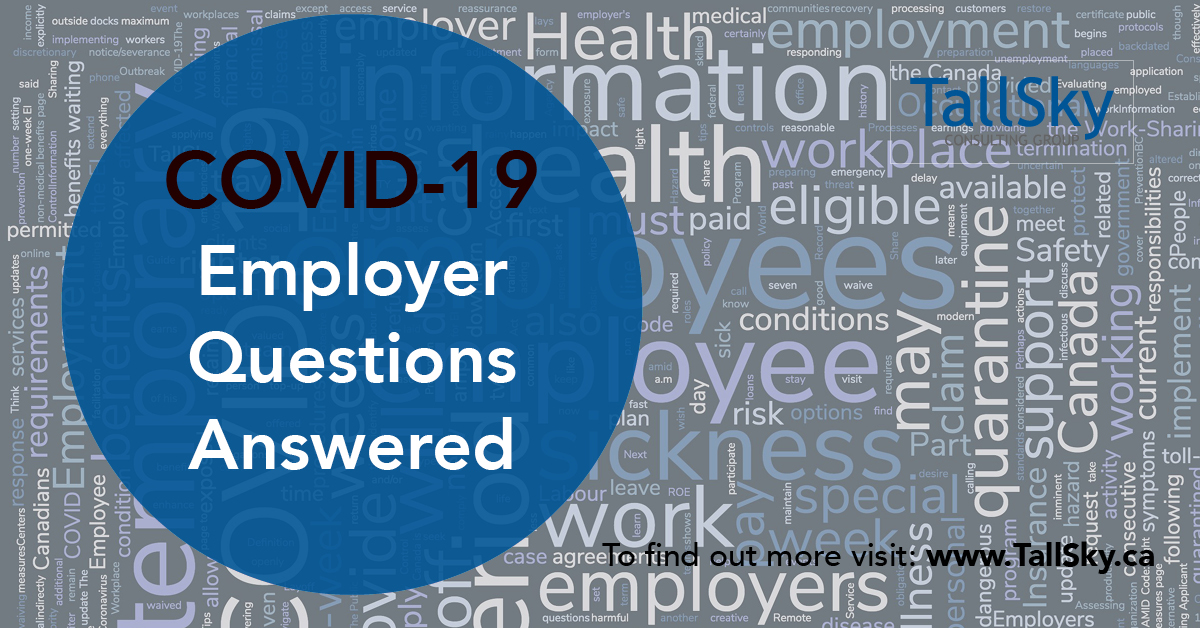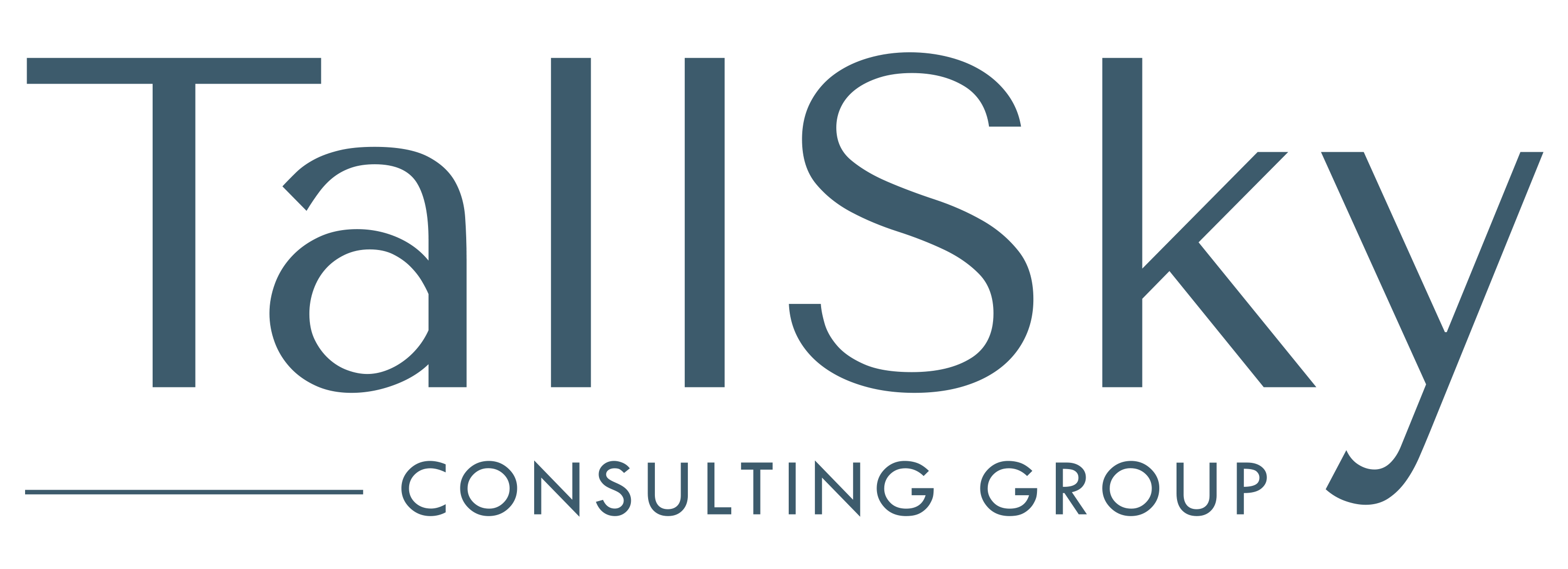
While COVID-19 updates are coming at us ‘fast and furious’, our TallSky team would like to provide you with another update in response to some of the more common questions our clients are asking us right now:
- Canada Employment Insurance (EI) amid COVID 19 – updated information
- Employer options in response to economic conditions related to COVID-19 government protocols
- Occupational Health & Safety
- Information and Resources
Next update coming soon:
- Tips for setting up and working from your home office
- Think “rainy day” tips for safeguarding discretionary spending
CANADA EMPLOYMENT INSURANCE – AMID COVID-19
EI Sickness Benefits for Employees:
Employment Insurance (EI) sickness benefits provide up to 15 weeks of income replacement and is available to eligible claimants who are unable to work because of illness, injury or quarantine, to allow them time to restore their health and return to work. Canadians quarantined can apply for Employment Insurance (EI) sickness benefits.
Employees may be eligible if they meet the EI requirement, visit the EI sickness benefits page to apply.
Service Canada is ready to support Canadians affected by COVID-19 and placed in quarantine, with the following support actions:
- The one-week waiting period for EI sickness benefits will be waived for new claimants who are quarantined so they can be paid for the first week of their claim
- Establishing a new dedicated toll-free phone number to support enquiries related to waiving the EI sickness benefits waiting period
- Priority EI application processing for EI sickness claims for clients under quarantine
- People claiming EI sickness benefits due to quarantine will not have to provide a medical certificate
- People who cannot complete their claim for EI sickness benefits due to quarantine may apply later and have their EI claim backdated to cover the period of delay
Share this contact information for employees if they are in quarantine and seeking to waive the one-week EI sickness benefits waiting period and be paid for the first week of their claim:
- Telephone: 1-833-381-2725 (toll-free)
- Teletypewriter (TTY): 1-800-529-3742
As an alternative, they may access services online or by calling 1 800 O-Canada (1-800-622-6232).
EMPLOYER OPTIONS IN RESPONSE TO ECONOMIC CONDITIONS RELATED TO COVID-19 GOVERNMENT PROTOCOLS:
Work Sharing – a temporary option:
The Work-Sharing program is implementing temporary special measures to support employers and employees affected by the downturn in business caused by COVID-19. The new temporary special measures are available to employers impacted directly or indirectly by COVID-19. The measures will allow eligible employers to retain skilled employees and workers to remain employed during the temporary downturn in business due to COVID-19. The temporary special measures will:
- extend the Work-Sharing agreements by an additional 38 weeks
- wave the mandatory waiting period between agreements
- ease the recovery plan requirements
Access the Work-Sharing page to learn more about the program and its requirements.
Access the Work-Sharing temporary special measures page to find out if you are eligible for temporary special measures.
For more information on the types of employers who may be eligible to consider this option and before applying, please read all the information provided (including the Work-Sharing Applicant Guide) and discuss it with your employees.
Temporary Layoff:
Where a temporary layoff is permitted, the maximum length of time that an employee can be laid off is 13 weeks in a consecutive 20-week period. The 20-week period begins on the first day of the layoff.
If an employee earns less than 50% of his or her regular wages in any week that falls within the 20-week period, that week will also count towards the 13-week period.
If an employer lays off an employee, except in the circumstances set out in the Employment Standards Act (British Columbia), within an employment contract or with employee consent, the layoff will amount to a termination of the employee’s employment and the employee must be paid termination/severance pay. A layoff also becomes a termination of employment once it exceeds 13 weeks in a consecutive 20-week period.
Given the current conditions and the financial impact of COVID-19, employers who have not received consent from employees to accept a temporary layoff are in a good defensible position to argue a temporary layoff is implicitly permitted in the circumstances as the recent government direction was an intervening event in an employer’s otherwise unilateral action.
Employee Rights?
As an employer you can request an employee leave the workplace if they are showing symptoms of an illness to protect the health and safety of your customers and employees. You can also ask your employee to take two weeks off work without pay and self-quarantine due to international travel and COVID 19, but what are their rights in Canada?
In the past, an employer that docks pay for two weeks could well be facing a case of constructive dismissal. Constructive dismissal means that even though you didn’t explicitly terminate their employment, you effectively did so by breaching a fundamental term of the employment relationship. Your employee could then seek some form of notice/severance entitlement.
Having said that, current medical recommendations from our public health and government are for anyone who has returned from travel outside of Canada to self-quarantine for 14 days. Your request for an employee to stay home would certainly be considered reasonable, particularly in light of the obligations under the Occupational Health and Safety Act to keep the workplace safe. This is also the case if an employee shows symptoms of an illness in the workplace.
In the circumstances, employers wanting to retain their valued employees may wish to consider a temporary adjustment to their sick leave policy for sick pay and/or personal days. Perhaps there are creative work from home options to be offered to maintain productivity and employee earnings. Could your company provide emergency pay loans to help employees meet their personal financial obligation or implement a supplementary unemployment benefit plan to top-up EI benefits?
OCCUPATIONAL HEALTH & SAFETY:
A note on roles and responsibilities
The Public Health Agency of Canada is responsible for preparing for and responding to any infectious disease emergencies that may happen in Canada.
Employers are responsible for protecting the health and safety of their employees while at work.
Employer responsibilities under Part II of the Canada Labour Code
Employers are responsible for protecting the health and safety of employees at work. They are required to implement preventative measures to ensure employees are not exposed to conditions that could be harmful to their health or safety while working.
If there is a risk of exposure to COVID-19 for employees while working, employers must:
- identify the risk
- assess the risk, and
- implement proper controls through their Hazard Prevention Program
If the employer requires personal protective equipment, they must provide training and procedures to employees. Employees must comply with the employer’s procedures.
Employee rights under Part II of the Canada Labour Code
Under the Code, employees have 3 basic rights:
- the right to know
- the right to participate, and
- the right to refuse dangerous work
Definition of danger: “any hazard, condition or activity that could reasonably be expected to be an imminent or serious threat to the life or health of a person exposed to it before the hazard or condition can be corrected or the activity altered.”
For more information about refusal to work under Part II of the Code: Right to refuse dangerous work
INFORMATION AND RESOURCES
BC Health line: call 1-888-COVID19 for non-medical information on the virus covering everything from travel recommendations to social distancing. The line will be manned by service representatives from 7:30 a.m. to 8 p.m. seven days a week, and information will be provided in more than 110 languages.
Or: text 604-630-0300 for COVID-19 information.
Information about coronavirus and prevention:
- Coronavirus disease (COVID-19): Outbreak update
- The World Health Organization (WHO) information and preventative measures
- Centers for Disease Control and Prevention
- BC Centre for Disease Control
Information on workplace health and safety, and federal labour standards:
The impact of this illness is unprecedented in our modern history and it is only by working together, communicating openly, providing as much information and reassurance to each other and our teams, that we will navigate these uncertain times.
Our team at TallSky Consulting is here to support all of your HR requirements and we share your desire to enhance and protect the health and well-being of our communities and workplaces.
Given current events, we are available to provide the following services:
- Evaluating remote-work policies and practices
- Remote interview preparation and facilitation
- Assessing workplace readiness plans
DISCLAIMER: The information is provided as general information on these topics, and given the rapidly evolving environment, they may not be relevant with recent updates or changes on the topic. These materials are not meant to be a substitute for specific legal advice. Please do not rely solely upon this information for making decisions regarding employees in your workplace.
